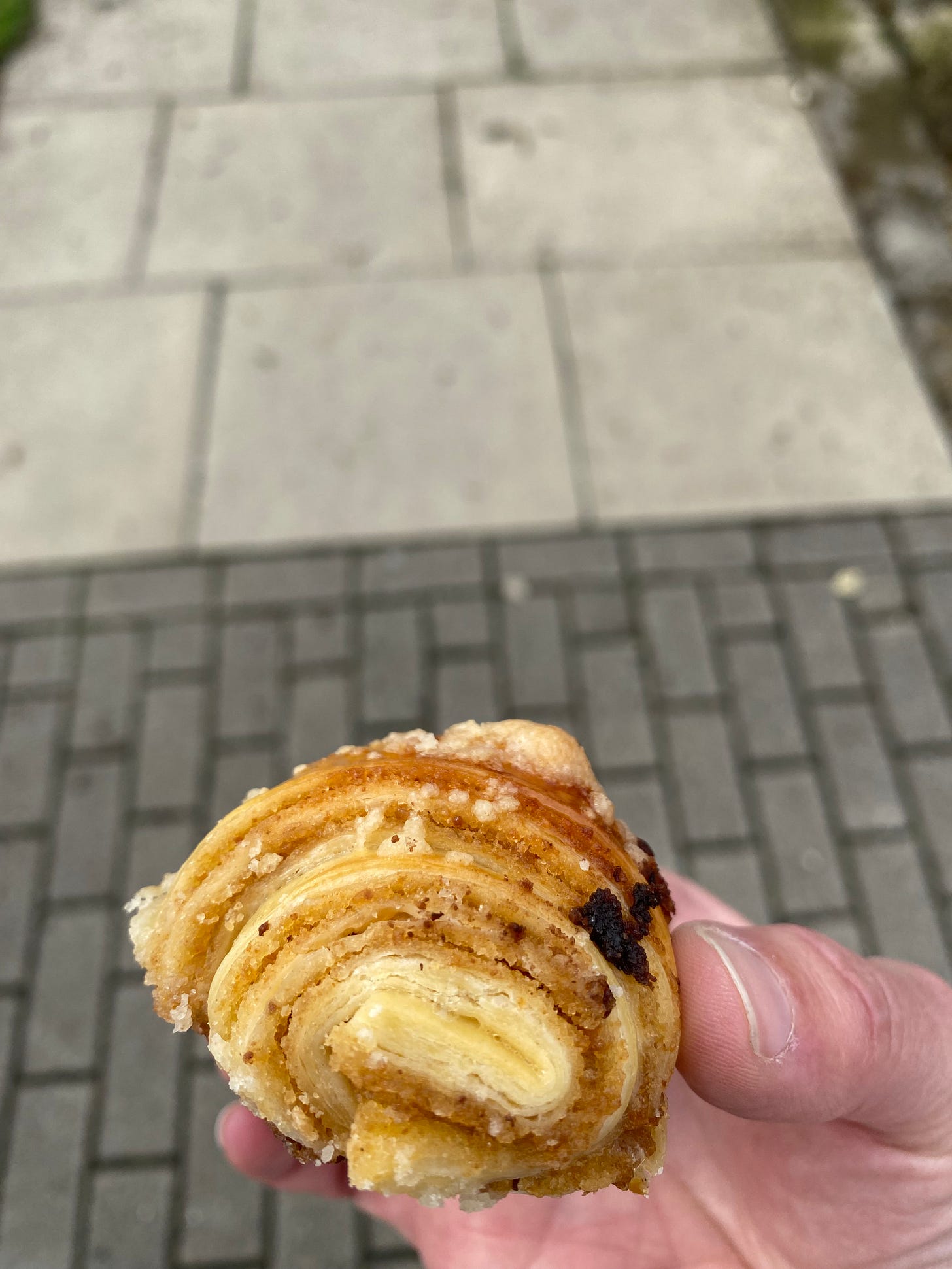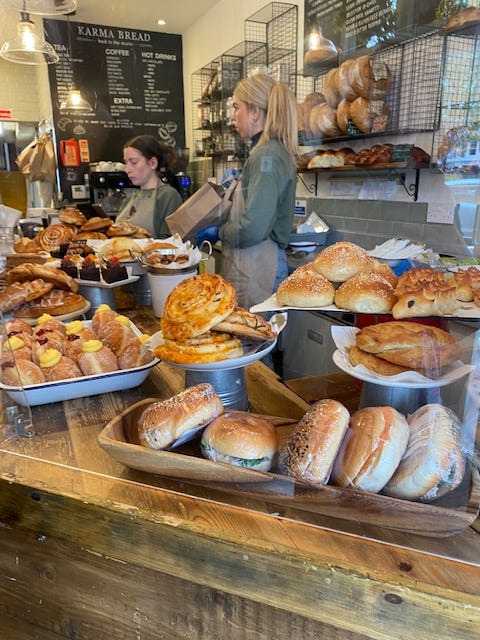The London Rugelach Index
A guide to London's Jewish bakeries via its smallest offering. Words by Adrienne Katz-Kennedy
This article is a part of Vittles British Jewish Food Week. To read the rest of the essays and guides in the project, please subscribe below:
The London Rugelach Index, by Adrienne Katz-Kennedy
A guide to London's Jewish bakeries via its smallest offering
Many Americans who have emigrated look back on the lack of self-awareness in their earliest experiences abroad with a thick glaze of embarrassment. When I think about my first impressions of British Jewish food, so do I. Since moving to the UK in 2006, I have been faced with the discomfort of my own assumptions about what it means to be Jewish, and how much of my identity exists in context and community. I remember my first trip to Golders Green in North London on a Friday afternoon, some 15 years ago, when I was struck by the assumptions I hadn’t realised I’d been making about the roles and presence of secular Jewish culture within the city; the places I wanted to visit were either closed or were closing for Shabbat. When I began looking for the secular food customs I knew from home – bakeries making their own bagels, the delis that would fill up on Sunday mornings, even the tradition of eating Chinese food at Christmas – I found myself at a loss for how exactly to recalibrate the Jewish American identity I had unknowingly carried with me within a Jewish-British context. What was Jewish British culture? I didn’t even really know what to look for.
Take rugelach, for instance. The name rugelach comes from Yiddish, meaning ‘little twists’ or ‘rolled things’, referring to its shape. Its origins stem from a combination of Eastern European communities and pastries (kifli, kipferl, rogal, rogaliki…), all of which are small, crescent-shaped and, most often, laminated. Rugelach in the US, like a good portion of the American food system, exists because of the World Wars, the Great Depression and the rise of convenience foods that emerged from them. The yeast once present in rugelach was removed to save time and reduce the cost of labour, while cream cheese was added only because of the influence of Philadelphia post-Depression. (This is a staggering example of how powerful marketing can be – it managed to insert dairy into the cuisine of a culture prone to lactose intolerance.)
Yet rugelach in the UK is a different thing entirely. Across London there are nuances that depend on the bakery’s community, as well as the personal history of the individual baker. The most commonly found fillings are chocolate, cinnamon and vanilla, while most bakeries produce a yeast-enhanced, laminated dough, like the original Eastern Europe variations. The word ‘rugelach’ can sometimes mean different things in different bakeries: in some it signifies a shape and filling but can be as large as a croissant; in others, ordering ‘rugelach’ can simply refer to any miniature-sized pastry. Some bakeries offer ‘flaky rugelach’ made from unyeasted dough which is then rolled into spirals with fruit fillings. At others, the rugelach are so dense and squidgy with chocolate you’ll wonder if there’s any dough at all.
Unlike its sister, the babka, which has slipped into more mainstream baking culture in both the US and the UK, rugelach has yet to establish itself outside of Jewish bakeries, which makes it an ideal item to understand London’s Jewish bakery scene through. Just like spotting someone with a fresh ice cream cone gives clues as to the proximity of the vendor, so too does a Jewish bakery and its symbiotic relationship with an active community: bread is baked into weekly rituals of British Jewish life. While the late Jonathan Gold once touted the American Jewish deli as the establishment where secular Jewish folks went “to be Jewish” I would suggest that, at least in London, it’s the bakery which distinctively serves as both a hub and a mirror of the city’s Jewish communities, with the ability to touch every aspect of Jewish life whether secular or sacred. And with each bakery comes a separate thread, a tie into the people or personas that have built the business. Many of these now institutions come with a backstory richer than even their most chocolate-filled pastry – reason enough to cross the city for another taste.
The Methodology
During the course of eight weeks, I ate rugelach at over 30 bakeries, and narrowed down my criteria for what makes a great London version:
Traditional yeasted or laminated dough that is slightly crisp and flaky on the outside. Some bakeries use an outer glaze, others don’t. Both can be delicious.
A good amount of stretch while still being fully baked. I prefer a thinner laminated dough but thicker is fine too, although it is easier to underbake.
A distinctive filling you can taste, making the inside of the rugelach a bit squidgy and moist.
The pastry should make you feel a desire and satisfaction in peeling apart the dough when eating it. It is a visceral pleasure that comes from the twists-meets-stretch and cannot be understated.
An overview of London rugelach
There are as many bakeries in Stamford Hill as there are walking routes to shul, and this dense network mainly caters to the area’s close-knit Orthodox and Hasidic Jewish communities. The bakes here, however, are not conservative but instead exhibit the widest range of flavours, shapes and interpretations. Even the smallest bakeries offer chocolate rugelach, much to the delight of the groups of Orthodox schoolboys on bikes. At So Real on Oldhill Street, Jewish Stamford Hill’s epicentre, customers flow in and out in record time, each with a seemingly specific pastry in mind. Packs labelled ‘rugelach’ (both flaky and yeasted) offer a choice between plain or streusel and ground almond-topped. Filling choices range from the traditional chocolate and cinnamon to fruit-flavoured, and their yeasted cinnamon swirl with streusel and ground almonds is fantastic in its specificity without being too over the top. At the recently expanded branch of Grodzinski’s, you’ll find a solid example of chocolate rugelach – I only wish it sold individual flavours in addition (cinnamon and vanilla were only available in packs). I did spot on the shelves a ‘Grab a Kokosh’ with a crumble topping whose shape is similar to the American style of rugelach: roll one big log then sliced 3/4 of the way through to be broken off into individual pieces.
Some Stamford Hill bakeries are a bit less visible, or at least less public-facing, catering instead to businesses or for bar/bat mitzvahs, rather than individual customers. At Renbake Patisserie, on an industrial estate near the River Lea, you have to order through the office which overlooks the bakery, where thick catalogues detail the very many catering options. Staff were happy to sell me a box of whatever I fancied from the catalogue, which included three varieties of rugelach: vanilla, chocolate and cinnamon. Meanwhile at Woodberry Down Bakery, which sells wholesale to other local shops, I had to earn my chocolate rugelach with a bit of detective work to find the entrance (the doors are completely unmarked, save for signs indicating the work laws on Shabbat.) I’m told shopping from them in person is a move that has only traditionally been executed by Woodberry’s most loyal customers. But I’d happily do it again. Its distinctive filling, made with vanilla and coffee, creates a perfectly bittersweet and slightly boozy-tasting pastry.
Golders Green and Temple Fortune have become well-known for both Ashkenazi and Sephardic communities, with restaurants, shops and bakeries serving a wide range of kosher foods from each diaspora. Here, though, the rugelach offerings remain quite traditional compared to Stamford Hill – a likely response to demand and the ability to have wider representation of Jewish foods, rather than deep-diving on one particular bake. At the galley kitchen-sized Parkway Patisserie (cash only) across the street from Golders Green station, exceptionally sticky chocolate rugelach come in packs of 12 (or you can buy one giant croissant-sized version, while at Coco’s, which serves largely Ashkenazic pastries and salad bar items, chocolate rugelach are bulbous, bigger than the size of a hand with outstretched fingers. Daniel’s Bakery was the first place where I overheard other customers referring to some of their other smaller pastries of a different shape as rugelach, which appears to be a London quirk.
The rugelach belt stretches further north to Hendon and then Edgware, where many of the newer Jewish communities have settled. Edgware is home to the unassuming Yossi’s Bakery, whose owner, Yossi Moses, has quietly become London’s kosher bakery king since acquiring ownership of Grodzinski’s and Carmelli’s. The vanilla rugelach, which comes with streusel on top, has thick pastry, with a slightly creamy, near eggy taste of lokshen kugel. Sharon’s Bakery has customers so loyal they’ll stop an inquisitive stranger on the street to tell them about their products. While I was contemplating that nearby Grodzinski’s had sold out of rugelach, a man told me to cross the street. Sharon’s was by far the best of all the large versions that I tried: soft and chewy on the inside with an intensely dark chocolate filling and nice lamination. Yummie’s in nearby Mill Hill, who have recently acquired the famed Shalom Hot Bagels in Gants Hill, meanwhile, serves as a community catch-all, offering kosher sweets and baked goods alongside imported South African and deli products. The chocolate rugelach comes topped with a hardened chocolate drizzle that pushes the experience closer towards confectionery.
For those who like a bit of electric energy with their pastry, the buzz on a Friday in Hendon Bagel Bakery is a thing to experience. The place is filled with men with kippahs and salt and pepper hair conducting friendly breakfast meetings between seven-foot-tall bakery carts stacked with challah. It’s the Jewish equivalent of a corn maze, with women pacing back and forth behind the bakery counter like a game of duck hunt, keeping the queue moving. When I inquired about rugelach flavours one of them rattled off a list of fillings: the standard chocolate and vanilla, cherry, pineapple and raisin. Like Daniel’s, many of the ‘rugelach’ suggested look like mini Danish instead of ‘little twists’.
Perhaps the place that summed up the appeal of rugelach and the role of Jewish bakeries more than anywhere else for me is King’s Bakery in Hampstead Garden Suburb. It’s not just that it’s family-run and discoverable only through word of mouth (no website) or that the grandfather-like owner takes it upon himself to interact with customers, oscillating between light teasing and generosity. It’s that this is the only bakery where I witnessed the same behaviour that I remember from my own childhood in America: a local, newly minted two-year-old, having stopped by with his mum to choose his birthday treat. Some things don’t translate, but this is universal.
The top 5:
5. Karma Bread










